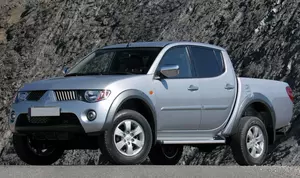
| Vehicle | Curb weight | Difference from world's smallest | Weight to power ratio | 0—60 mph acceleration ratio | Consumption ratio |
|---|---|---|---|---|---|
| 2.4d |
1790 kg / 3947 lbs |
1365 kg (3010 lbs) heavier | 12 kg to 1 hp | 154 kg/s (340 lbs/s) |
259 kg/L (571 lbs/L) |
| Vehicle | 2.4d |
|---|---|
| Curb weight |
1790 kg / 3947 lbs |
| Difference from world's smallest | 1365 kg (1365 lbs) heavier |
| Weight to power ratio | 12 kg to 1 hp |
| 0—60 mph acceleration ratio | 154 kg/s (340 lbs/s) |
| Consumption ratio |
259 kg/L (571 lbs/L) |

| Vehicle | Curb weight | Difference from world's smallest | Weight to power ratio | 0—60 mph acceleration ratio | Consumption ratio |
|---|---|---|---|---|---|
| 2.4d |
1805 kg / 3980 lbs |
1380 kg (3043 lbs) heavier | 12 kg to 1 hp | 156 kg/s (344 lbs/s) |
262 kg/L (578 lbs/L) |
| Vehicle | 2.4d |
|---|---|
| Curb weight |
1805 kg / 3980 lbs |
| Difference from world's smallest | 1380 kg (1380 lbs) heavier |
| Weight to power ratio | 12 kg to 1 hp |
| 0—60 mph acceleration ratio | 156 kg/s (344 lbs/s) |
| Consumption ratio |
262 kg/L (578 lbs/L) |

| Vehicle | Curb weight | Difference from world's smallest | Weight to power ratio | 0—60 mph acceleration ratio | Consumption ratio |
|---|---|---|---|---|---|
| 2.4d |
1860 kg / 4101 lbs |
1435 kg (3164 lbs) heavier | 10 kg to 1 hp | 166 kg/s (366 lbs/s) |
248 kg/L (547 lbs/L) |
| Vehicle | 2.4d |
|---|---|
| Curb weight |
1860 kg / 4101 lbs |
| Difference from world's smallest | 1435 kg (1435 lbs) heavier |
| Weight to power ratio | 10 kg to 1 hp |
| 0—60 mph acceleration ratio | 166 kg/s (366 lbs/s) |
| Consumption ratio |
248 kg/L (547 lbs/L) |

| Vehicle | Curb weight | Difference from world's smallest | Weight to power ratio | 0—60 mph acceleration ratio | Consumption ratio |
|---|---|---|---|---|---|
| 2.5 HP DI-D |
1900 kg / 4190 lbs |
1475 kg (3253 lbs) heavier | 11 kg to 1 hp | 165 kg/s (364 lbs/s) |
247 kg/L (545 lbs/L) |
| 2.5 DI-D |
1870 kg / 4123 lbs |
1445 kg (3186 lbs) heavier | 14 kg to 1 hp | 141 kg/s (311 lbs/s) |
249 kg/L (549 lbs/L) |
| Vehicle | 2.5 HP DI-D |
|---|---|
| Curb weight |
1900 kg / 4190 lbs |
| Difference from world's smallest | 1475 kg (1475 lbs) heavier |
| Weight to power ratio | 11 kg to 1 hp |
| 0—60 mph acceleration ratio | 165 kg/s (364 lbs/s) |
| Consumption ratio |
247 kg/L (545 lbs/L) |
| Vehicle | 2.5 DI-D |
| Curb weight |
1870 kg / 4123 lbs |
| Difference from world's smallest | 1445 kg (1445 lbs) heavier |
| Weight to power ratio | 14 kg to 1 hp |
| 0—60 mph acceleration ratio | 141 kg/s (311 lbs/s) |
| Consumption ratio |
249 kg/L (549 lbs/L) |

| Vehicle | Curb weight | Difference from world's smallest | Weight to power ratio | 0—60 mph acceleration ratio | Consumption ratio |
|---|---|---|---|---|---|
| 2.5 TD |
1935 kg / 4267 lbs |
1510 kg (3330 lbs) heavier | 14 kg to 1 hp | 139 kg/s (306 lbs/s) |
225 kg/L (496 lbs/L) |
| Vehicle | 2.5 TD |
|---|---|
| Curb weight |
1935 kg / 4267 lbs |
| Difference from world's smallest | 1510 kg (1510 lbs) heavier |
| Weight to power ratio | 14 kg to 1 hp |
| 0—60 mph acceleration ratio | 139 kg/s (306 lbs/s) |
| Consumption ratio |
225 kg/L (496 lbs/L) |

| Vehicle | Curb weight | Difference from world's smallest | Weight to power ratio | 0—60 mph acceleration ratio | Consumption ratio |
|---|---|---|---|---|---|
| 2.0 i 2WD |
1380 kg / 3043 lbs |
955 kg (2106 lbs) heavier | 15 kg to 1 hp | - | - |
| 2.5 TD 4x4 |
1810 kg / 3991 lbs |
1385 kg (3054 lbs) heavier | 18 kg to 1 hp | - | - |
| 2.4 4x4 |
1660 kg / 3660 lbs |
1235 kg (2723 lbs) heavier | 13 kg to 1 hp | - | - |
| 2.5 TD 4X4 |
1820 kg / 4013 lbs |
1395 kg (3076 lbs) heavier | 20 kg to 1 hp | - | - |
| Vehicle | 2.0 i 2WD |
|---|---|
| Curb weight |
1380 kg / 3043 lbs |
| Difference from world's smallest | 955 kg (955 lbs) heavier |
| Weight to power ratio | 15 kg to 1 hp |
| 0—60 mph acceleration ratio | - |
| Consumption ratio | - |
| Vehicle | 2.5 TD 4x4 |
| Curb weight |
1810 kg / 3991 lbs |
| Difference from world's smallest | 1385 kg (1385 lbs) heavier |
| Weight to power ratio | 18 kg to 1 hp |
| 0—60 mph acceleration ratio | - |
| Consumption ratio | - |
| Vehicle | 2.4 4x4 |
| Curb weight |
1660 kg / 3660 lbs |
| Difference from world's smallest | 1235 kg (1235 lbs) heavier |
| Weight to power ratio | 13 kg to 1 hp |
| 0—60 mph acceleration ratio | - |
| Consumption ratio | - |
| Vehicle | 2.5 TD 4X4 |
| Curb weight |
1820 kg / 4013 lbs |
| Difference from world's smallest | 1395 kg (1395 lbs) heavier |
| Weight to power ratio | 20 kg to 1 hp |
| 0—60 mph acceleration ratio | - |
| Consumption ratio | - |